Miguel Díaz-Canel, the Cuban leader, has expressed his sorrow over the passing of Gabriel Escarrer Juliá, the founder of Meliá Hotels International. He acknowledged Escarrer's status as a "global leader in the tourism sector" and highlighted his commitment to Cuba. "My condolences to the family, friends, and the Meliá Hotels International family, all shocked by Gabriel Escarrer's death, a world leader in tourism. He invested in Cuba and left us with valuable lessons to follow. Farewell, friend," said Díaz-Canel, who also serves as the First Secretary of the Communist Party of Cuba.
However, the long-standing relationship between Meliá and the Cuban regime calls for a deeper exploration of the implications behind this "investment." Escarrer, who passed away at the age of 89, transformed Meliá into one of the largest hotel chains globally, leaving behind a nearly seven-decade-long legacy. His connection with Cuba began in the 1990s, during the "Special Period," when dictator Fidel Castro turned to tourism to salvage the Cuban economy after the Soviet bloc's collapse.
A Controversial Partnership: Meliá and Cuban Tourism
Meliá emerged as a strategic partner for the Cuban regime, operating under a model where the Cuban state owned the properties and the Spanish chain managed the hotels. This arrangement continues to this day, under the leadership of Gabriel Escarrer, son of the founder.
The alliance between Meliá and the Cuban government has been contentious. While the regime prioritizes building hotels and tourist complexes, essential sectors like agriculture, health, and basic infrastructure remain neglected. The regime's focus on tourism, often lauded as an economic solution, has also faced criticism for perpetuating an economic model that primarily benefits government elites and foreign partners. The business model in Cuba raises serious questions about labor rights and inequalities in employment opportunities within the tourism sector.
"An Investment in Cuba": Who Truly Benefits?
Cuban workers employed at hotels operated by Meliá and other foreign chains receive their wages in Cuban pesos, while room rates are charged in foreign currency, creating a significant economic disparity. This system has been condemned by human rights organizations as a form of covert labor exploitation.
Tourism has been a financial cornerstone for the regime, generating foreign currency revenues that largely do not directly benefit the Cuban populace. Tourist remittances and hotel revenues funnel into the coffers of entities like the Grupo de Administración Empresarial S.A. (GAESA), controlled by the regime's armed forces. By operating alongside these entities, Meliá has been criticized for its role in sustaining the regime's repressive apparatus.
Despite the severe economic crisis in Cuba, the regime continues to pour millions of dollars into hotel infrastructure while hospitals lack basic medications and Cubans face widespread food shortages. These decisions have intensified social unrest, highlighting the distorted priorities of an administration that favors attracting foreign tourists over addressing the urgent needs of its own people.
Business Legacy vs. Social Reality
Gabriel Escarrer Juliá will be remembered as a visionary who contributed to the growth of global tourism. However, in the Cuban context, his legacy is intertwined with a business model that, rather than empowering the local population, has reinforced a political system that restricts rights and freedoms. Díaz-Canel praised Escarrer's contributions as "valuable lessons to follow," but the question remains: Follow for whom? While government elites and international partners reap the benefits of tourism, the Cuban population faces growing economic inequality and a lack of opportunities that contradict the official narrative.
In this context, it is critical to maintain a critical perspective on the relations between the Cuban regime and its international partners, ensuring that the narrative about tourism does not obscure the inequalities and violations that underlie this key sector of the Cuban economy.
